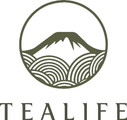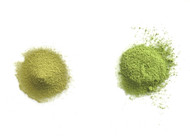Quiz: Is this a Good or Bad Matcha Powder?
Posted by yuki on Oct 18, 2020
Quiz: Which is the Good Matcha Powder? Left or right?
Let’s start off with a little quiz. Take a look at the picture below.
Here you can see 2 different types of Matcha powder. The Matcha powder on the left is a golden yellowish green. The Matcha powder on the right is a brilliant green.
Question. Which is the better Matcha?
Try making your guess.
Which is the better Matcha?
If you answered “the Matcha powder on the right is the better Matcha”, then Congratulations! That’s correct!
Yes, you always want to look for brilliant green Matcha powder. The yellowish color is a sign of lower quality or diminished quality of the Matcha powder.
The actual products in the picture
The yellowish Matcha on the left is actually a pretty expensive product. I bought this as a Matcha suitable not only for Usucha (which is thin-tea style) but also Koicha (or thick tea style). Any Koicha style preparation demands a very high quality of Matcha, so I was excited to try this when it arrived. I was originally considering this as a Matcha powder for the Tealife online shop.
Unfortunately, the color was not as I hoped, and the taste was unacceptable even in an Usucha (thin tea) preparation. It was immediately set aside to be used for culinary purposes - but as I already have my go-to Matcha powder in Marukyu Koyamaen’s Aoarashi for cooking, I left it sitting for a while. This contributed a little more in terms of reduction in quality. You can see it’s become very yellowish.
The powder on the right is a premium quality product which is suitable for both Usucha and Koicha style Matcha as well.
This is the Matcha powder "Unkaku" by Marukyu Koyamaen. Unkaku is an exceptional Matcha with great Umami, Aroma, and a remarkably reduced amount of Astringency. It's really my personal go-to Matcha when I want nice quality Matcha Powder (and is still within my acceptable budget).
This brilliant green resembles the great quality and fantastic storage conditions of this powder. So always look out for this type of brilliant green colour.
To advertise the Tealife shop a little, you can buy this Matcha powder here.
The difficulty of choosing good Matcha
The surprising thing is that the yellowish Matcha powder on the left is actually of a similar price point to the Unkaku. The name of the powder is suffixed with “No-Mukashi” which indicates a Matcha of premium quality. If I can’t see the product or taste the product, the name and the price point would be my only point of references. This is the only way i can try to assess the quality of the Matcha powder before purchase. That is exactly what I did, and boy did the product not meet my expectations!
And as you can see from this example here, the name and prices of the Matcha are both factors that can be easily manipulated by Manufacturers or re-packaging processors. The price of the product is not always indicative of the taste of Matcha.
In fact, especially outside of Japan, it can be dangerously deceptive. This is because the overall quality of Matcha outside of Japanese is dangerously low. Manufacturers and distributors can get away with selling low-quality Matcha at a high price.
There are many cases which I suspect they sell normal powdered green tea and label this as "Matcha".
Powdered green tea is very different from Matcha. While Matcha is made from tea leaves that are shaded from the sun for roughly 3 weeks, powdered green tea does not. Matcha is very difficult to produce and requires substantial cost and expertise. This generates the taste and aroma unique to Matcha. Many of the so called “Matcha” in the market do not meet these standards.
This is such a concern and detrimental to the Matcha market... but it does happen. We must make sure we avoid such products.
How can I choose the best quality Matcha?
There are a few strategies you can employ to make sure that you're getting great Matcha powder. Here are three that you can look out for.
1. Samples
The first option is to try to get some samples. Whether it be buying in small quantities, or trying the taste for free, this is the surefire way to understand the quality of the tea.
However, the problem with Matcha is that samples are difficult to obtain. Not too many products and shops offer such thing. If there is a Matcha cafe, you might be able to get some there. However, it must be considered rather lucky if you are able to access some samples before you buy.
2. Are they a National Tea Competition winner?
If a tea manufacturer can brag that they've won an award in the National Tea Competition of Japan, that's a pretty good indicator that it is a great quality tea manufacturer.
The National tea Competition of Japan is a government supported annual competition to grade and rank the quality of tea. It is a fair competition as the purpose of the event is to promote the progression of Japanese tea manufacturing standards. It doesn't just give out awards, but provide feedback to the contestants to help improve their quality moving forward.
There are about 20 thousand tea farms in Japan, but only a select group from each prefecture (about a hundred products in total) will be able to enter the National Tea competition for Matcha each year. Out of this, only about 5 will win an award. Some years there are more, and some years there are less, but the number of winners don't fluctuate too much.
It really doesn't matter which award they won - because any award in that competition is so elusive and difficult to obtain. If they have touched an award even once in the past decade or so, it means it's a top-notch tea manufacturer.
For example, Marukyu Koyamaen is a tea producer which has won the No 1 award 30 times in the past, and also in the latest competition held in Aug 2020 as well. You can tell from this that it is undoubtedly a leader in Matcha quality, and will not go wrong with choosing their products.
(Since Marukyu Koyamaen is so well established, there is a copy Matcha product that uses the exact same package design but is manufactured by a different company in China. They even copied the name of the company to look similar, so make sure the Matcha is produced in Kyoto Japan instead of China)
Marukyu Koyaman is one example, but any other tea that has won an award in this competition is safe to try.
The problem with this approach is that there are only a few tea producers who have won this award, and may be difficult to access. It doesn’t mean that small tea farms who haven’t won this award are not good either.
In fact, there are fantastic tea who haven’t won the award. The level of tea in the National Tea Competition is so high, that in most cases any tea that ranks in the top 30 are already exceptional.
On top of that, 40% of the evaluation points in the competition of the tea is in the visual presentation of the tea leaves, which for us normal Matcha consumers, may not be as important. Many exceptional tea in the competition are deducted for how the leaves look, but may taste just as nice.
So while choosing winners may be effective, you’ll miss out on a whole bunch of great tea producers.
So comes our 3rd strategy.
3. Buy from a select shop
Buy the tea from a trusted source. Someone who is not the producer of the tea, so the recommendation does not get influenced. Someone who can do the proper assessment of the quality of the product. Perhaps a friend who can recommend a great tea, or if you don’t have one, use a select shop.
This is because their goal is not to sell a CERTAIN tea. It's to gain a customer's trust by recommending the good tea. They want you to choose the RIGHT tea for you.
While the first 2 strategies are difficult to exercise, this third one is quite accessible.
This is one of the values that a shop like Tealife has. We don’t sell our own tea. We're a select shop that source the tea which we ourselves really like. We feel joy in sharing these great products with you.
If you have questions, you can ask us and we can recommend without any bias. If you don’t like the tea, we take your feedback very seriously, and look for more suitable tea.
And we’re not the only one - I’m sure there are many other select shops like us. Use the knowledge of these experts to your advantage.
After all, Matcha is indeed a pricey item. Don’t risk!
About the Author: Yuki
Yuki is a Japanese tea enthusiast living in Singapore. He takes a few hours each week sharing about his passion to locals and also helping Tealife SG. Still a beginner in writing, it requires him about 10 cups of tea before finishing a post. His day job is in the healthcare IT domain.

